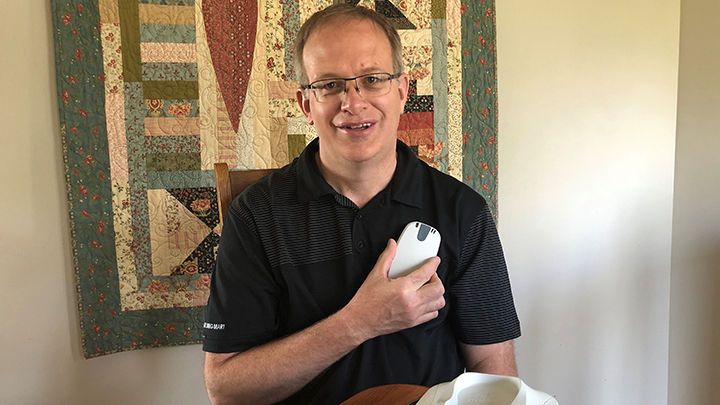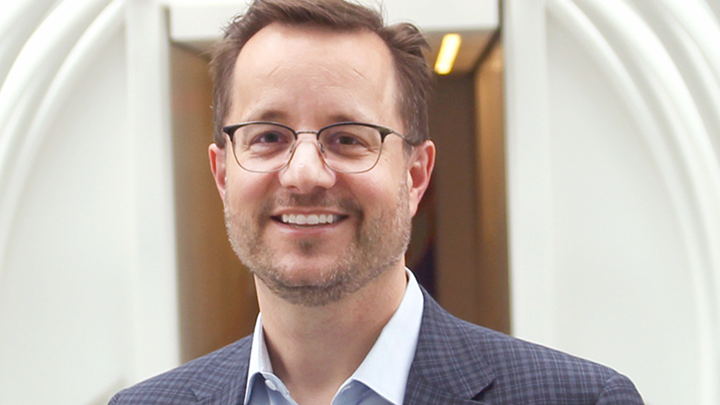June 10, 2020
Remote monitoring brings cardiac care to the patient
If Chris Goodbrand wakes up in the middle of the night worried he might be having ticker trouble, he has a straightforward process to find out for sure.
The 48-year-old resident of Coronation, about 300 km northeast of Calgary, calls in to the Cardiac Implantable Electrical Device (CIED) Clinic at Foothills Medical Centre, lets his remote monitoring device transmit data to the team there, and they tell him right away if there’s an issue or not.
“It’s the best unit ever,” he says of his implanted pacemaker/defibrillator, and its accompanying monitoring unit. “I’m three-and-a-half hours away from Foothills, so if I feel like my heart is racing, or the defibrillator has given me a jolt, they can just check the data and say, ‘Yeah, actually you’re doing fine.’”
The team can remotely assess his device, recommend changes to his medications and, most importantly, determine if emergency medical attention is warranted.
Goodbrand is one of thousands of Albertans with remotely monitored CIEDs who have access to 24-hour support and care — regardless of where they live.
This provincewide innovation is now a standard of care that grew out of the PERFORM (Performance Evaluation and Rhythm Follow Up Optimization through Remote Monitoring) program. On June 3, the Health Quality Council of Alberta (HQCA) recognized PERFORM with a Patient Experience Award.
“It’s great that the program has received this recognition,” says Dr. Derek Exner, Calgary Heart Rhythm Specialist and the principal lead for PERFORM. “It’s really all about the patients. This treatment approach brings the care to the patient, instead of requiring that they come to us.”
By being able to monitor patients remotely, care teams can handle both unscheduled concerns and routine checkups, monitor implanted devices’ batteries and other functions.
About half of patients with a CIED don’t have remote monitoring in their home, but can access facilities in or near their own communities that do have that capability.
Remote monitoring gives patients peace of mind, knowing that expert support is just a phone call away or close to home. It saves them the time and expense it takes to travel to appointments, which in some cases can be significant.
“In this age of COVID-19, it’s also a huge advantage that patients don’t necessarily have to come in for a face-to-face visit. We can provide the same level of care remotely, minimizing risk and inconvenience,” Exner says.
The PERFORM project started in 2014 with a grant from PRIHS (Partnership for Research and Innovation in the Health System), which is overseen by Alberta Innovates and Alberta Health Services (AHS).
Although the HQCA award is mainly for standardizing care and providing remote monitoring of CIEDs across the province, PERFORM also focuses on establishing databases to collect information from cardiac devices, and using remote monitoring to improve care after a stroke.
“Sometimes in healthcare we throw around the term ‘collaborative,’ but this project has truly been a team effort with government, clinicians and administrative leaders, as well as patients, making huge contributions,” Exner adds.
In particular, Exner cites the support of Caroline Hatcher, Mishaela Houle — and the leadership of the Cardiovascular Health and Stroke Strategic Clinical Network — as critical to the success of the project.
Since then Lucy O. Reyes, RN, PERFORM Project Coordinator, and Dr. Satish Raj, the medical lead for the remote monitoring project, have helped turn it into a model for the rest of the country.
“Alberta is ahead of the pack and is seen as a leader in this area,” says Exner. “The level of care we’re able to provide is second to none.”
For Goodbrand, that means he can carry on with his busy life as pharmacist, farmer, husband and father of five without having to take lengthy road trips to Calgary. “For me here in rural Alberta, this is the best. The care I receive from my heart rhythm specialist, Dr. Glen Sumner and the team at Foothills is just terrific.”
HQCA’s Patient Experience Awards were established by the HQCA and its Patient and Family Advisory Committee to recognize and spread knowledge about initiatives that improve the patient’s overall experience in accessing and receiving healthcare services.

Coronation resident Chris Goodbrand shows the remote monitoring device he uses that transmits information to his cardiac care team in Calgary.

Dr. Derek Exner, Calgary Heart Rhythm Specialist
